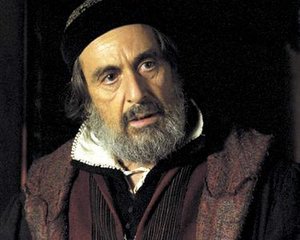
I attended with a group of friends on the first evening where we screened the film The Merchant of Venice, starring Al Pacino, pictured left. (The other films available for viewing this first night were Saving Private Ryan, Million Dollar Baby, Millions, Because of Winn-Dixie, and Billy Elliot) The movie was enjoyable, but I was going with my eyes analyzing how a religious-based film festival of this nature might look like, as I have thought before what it might look like to plan an event of this nature.
After myself and group of friends screened the film, and stuck around for the discussion we headed to a local coffee shop for further discussion of the film and the experience we had.
I think it is very positive to look at things and allow ourselves to connect religious understanding to things around us. I often watch a movie or read a book and the scene or dialogue conjures a thought that correlates to some understanding of mine of God or spiritual things. These lessons are often profitable for teaching and creating concrete images to help understand abstract things. The interesting thing is that two people with two drastically different beliefs can watch the same film and walk away seeing how their religion and world understanding is represented in the film that they are watching. This can be a challenge as I discovered because many people in the screening of the film were pointing out thoughts from the film that I did not agree with. And while these were sometimes interesting to here, they were often distracting from the points that I thought were important. But I sat and listened all the same.
Also, there is a unique issue, in that as people are drawing forth different thoughts, many people begin to use the film as the spring board for why there thoughts and individual beliefs are validated. I personally feel like your truth should be measured against the Bible, not against a film, rather the film is just a concrete example. (Otherwise lets call our beliefs doctrines of Shakespeareanism or Spielbergism if we are going to view these films as truth, not just stories). This led to a discussion on the value of "situational ethics" over following the letter of the law, and other such things that I thought were not necessarily valid theological positions.
This film is a challenging one as well to bring towards having a focused religious-themed conversation. It is not because the movie is not rich with religious implications and themes, but rather it is almost too full. Shakespeare is complicated and lends itself well to discussion, but following the film, the conversation often lent itself to literary discussion over religious discussion. (What is the symbolism of rings in this movie? Who are the men on the boats at the end? Why did the director include this? Were there Jews in England when Shakespeare wrote this play? etc.)
If you (or I) were planning a film festival, I think it would be important to be very cautious with your choice of film in terms of how long it lasts and when you are starting. Some people in our group were antsy from sitting for a little over two hours, and they were not in the mood to sit through a religious conversation...I can't imagine what it would feel like to sit through some of the longer movies that were screening over the course of the weekend.
After we left the church our group of film attendees went to a local coffee shop and we snagged some coffee. The religious discussion of the film was much richer and deeper. 8 people can discuss a film together far better than a group of 50. The conversation is more unified, focused and people get a better chance to speak as well as listen, also side conversations are more appropriate.
I think facilitation of conversations with a larger group is a great challenge. I thought that the man who led our session did an okay job leading our session, but there was one thing that really stood out as a great idea. He brought with him a simple handout that had the names of the characters with brief descriptions and a list of seven or so ideas for discussion after the movie. Having the list of characters, especially for this film was very helpful in giving us names with which everyone could comfortably dialogue about (there was no discussion after the movie of "which one was Jessica?" or "The man with the funny hair was a good guy," etc...because we knew there names and a little about them). Also the discussions were a good way to provide breadth to the conversation (although the group size, group dynamics, and time spent discussing gave very little depth).
I am very glad I went because I think I learned a lot about what it is like to do this type of event, and perhaps think about some ways movies can be effective in leading spiritual discussions but also some challenges that are bound to make the time less productive than one may wish


1 comment:
Thanks for reading my review, RC. I watched the film a while ago and I can't really remember what I thought of that scene at the time. I watched the film with a group as well and our discussion was about the anti-semitism at that historical period as well as the situation itself. Very good to watch.
Post a Comment